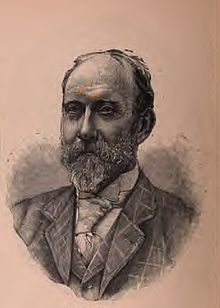William Wedderburn
| Sir William Wedderburn, Bt | |
|---|---|
 |
|
| Member of Parliament for Banffshire |
|
|
In office 1893–1900 |
|
| Preceded by | Sir Robert Duff |
| Succeeded by | Alexander William Black |
| Personal details | |
| Born | 25 March 1838 Edinburgh, Scotland, United Kingdom |
| Died | 25 January 1918 (aged 79) Meredith, England, United Kingdom |
| Political party | Liberal Party |
| Other political affiliations |
Indian National Congress |
| Alma mater | Edinburgh University |
| Profession | Civil servant, politician |
Sir William Wedderburn, 4th Baronet, JP DL (25 March 1838 – 25 January 1918) was a Scottish civil servant in India and a politician. He attempted to bring about reforms in banking to solve the problems of peasants during his working career. Failing to find support in reforms, he retired to help found the Indian National Congress and support local self-government.
Born in Edinburgh, the fourth and youngest son of Sir John Wedderburn, 2nd Baronet and Henrietta Louise Milburn, he was educated at Hofwyl Workshop, then Loretto School and finally at Edinburgh University. He joined the Indian Civil Service as his father and an older brother had done. His older brother John had been killed in the 1857 uprising and William joined the service in 1860 after ranking third (of 160 applicants) in the entrance exam of 1859.His elder brother David was the 3rd baronet.
He entered the Indian Civil Service in Bombay in 1860, served as District Judge and Judicial Commissioner in Sind; acted as secretary to Bombay Government, Judicial and Political Departments; and from 1885 acted as Judge of the High Court, Bombay. He retired when acting Chief Secretary to the Government of Bombay in 1887. During his work he noted the troubles of peasantry arising from moneylending and he suggested that co-operative agricultural banks be established to provide credits at reasonable rates. The proposal was supported in India but was blocked by the India Office. Wedderburn supported reforms suggested by Lord Ripon to develop local self-government and equality to Indian judges. He was seen as supporting the aspirations of Indians and was denied a judge position in the Bombay high court. This led him to retire early in 1887. Along with Allan Octavian Hume he was a founder of the Indian National Congress and served as its president in 1889 and 1910. He worked along with influential Congress leaders in Bombay and in 1890 he chaired the British committee of the Indian National Congress, helped publish the journal India and attempted to support the movement through parliamentary action in Britain. He developed a close working relationship with G. K. Gokhale of the Congress. He was an unsuccessful parliamentary candidate in North Ayrshire in 1892 and served as Liberal Member of Parliament for Banffshire from 1893 to 1900.
...
Wikipedia
